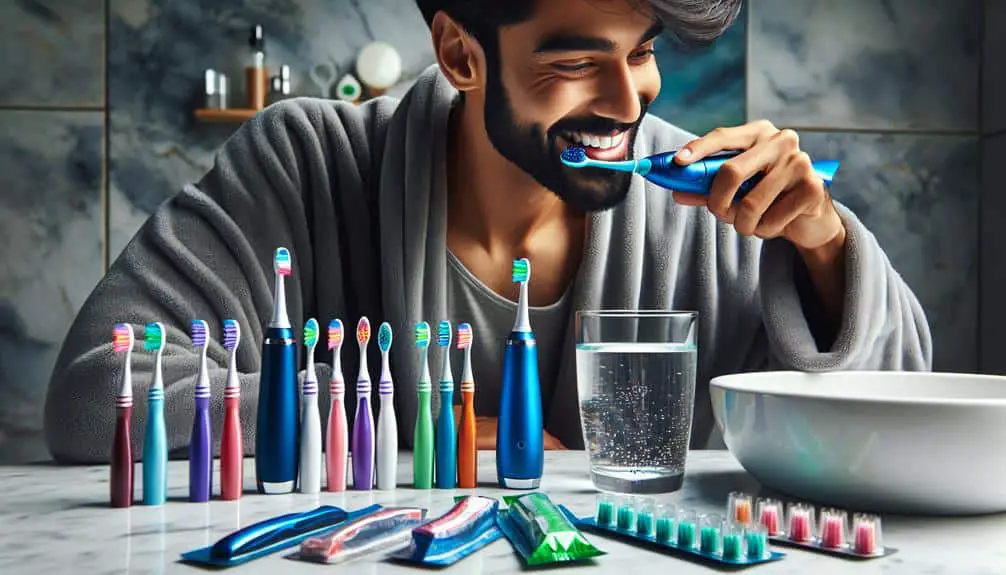To maintain a bright smile, brush your teeth twice daily for two minutes with a soft-bristled toothbrush and fluoride toothpaste. Remember to angle the brush at 45 degrees to your gums and cover all tooth surfaces, including your tongue. Be mindful of stain-causing foods and drinks like coffee and berries, opting for teeth-friendly snacks instead. Regular dental check-ups are essential for early issue detection, while touch-up whitening treatments can help maintain your teeth's brightness. Protect your teeth by avoiding excess acidic substances. More tips await to enhance your oral care routine for a lasting, radiant smile.
Key Points
- Practice daily oral hygiene with proper brushing techniques and fluoride toothpaste.
- Limit consumption of staining foods and drinks like coffee and berries.
- Schedule regular dental check-ups for early detection and professional cleanings.
- Consider touch-up whitening treatments as advised by your dentist.
- Prevent tooth damage by avoiding acidic substances and maintaining good oral habits.
Daily Oral Hygiene Practices
To maintain good oral health, consistently brush your teeth twice a day for two minutes each time. Proper brushing involves using a soft-bristled toothbrush and fluoride toothpaste. Hold your brush at a 45-degree angle to the gums and make gentle back-and-forth strokes. Make sure you brush the outer, inner, and chewing surfaces of all teeth. Don't forget to brush your tongue to remove bacteria and keep your breath fresh.
In addition to brushing, flossing techniques are essential for thorough oral care. Flossing helps remove plaque and food particles between teeth that brushing alone can't reach. Use about 18 inches of floss and hold it tightly between your thumbs and forefingers. Gently guide the floss between your teeth using a back-and-forth motion. Curve the floss into a 'C' shape around each tooth and under the gumline.
Minimize Staining Foods and Drinks
Minimizing consumption of foods and drinks that are known to cause staining can help maintain a bright smile. Dark-colored beverages like coffee, tea, and red wine, as well as foods such as berries, tomato sauce, and soy sauce, can stain your teeth over time.
To minimize the impact of these staining culprits, consider drinking through a straw. Using a straw helps direct the liquids past your teeth, reducing their contact and potential for staining.
Additionally, incorporating teeth-friendly snacks like crunchy fruits and vegetables can help naturally clean your teeth and reduce the buildup of stains. Opt for apples, carrots, or celery, which not only promote saliva production that aids in washing away food particles and bacteria but also act as gentle abrasives that can help polish your teeth.
Regular Dental Check-ups
Regular dental check-ups are crucial for maintaining optimal oral health and preventing potential issues. These scheduled visits are of utmost importance in the prevention and early detection of dental problems. Your dentist can pinpoint issues like cavities, gum disease, or oral cancer before they worsen, saving you from more extensive treatments later on. During check-ups, your dentist will also perform professional cleanings to remove plaque and tartar buildup that regular brushing and flossing might overlook.
The significance of regular dental check-ups can't be emphasized enough. Even if you brush and floss diligently, there are areas in your mouth that are difficult to access and require professional attention. By visiting your dentist regularly, you make sure that any developing concerns are addressed promptly, maintaining your oral health at its peak.
Prevention is crucial in oral care, and routine dental check-ups play a pivotal role in this aspect. By being proactive with your oral health, you can avoid painful and costly dental issues in the future. Be sure to schedule your next dental check-up to keep your smile bright and healthy.
Touch-up Whitening Treatments
Considering the longevity and vibrancy of your whitened smile, how often should touch-up whitening treatments be scheduled to maintain peak results? Touch-up whitening treatments are essential for whitening maintenance and smile enhancement. The frequency of these treatments can vary based on individual habits and needs. Here are some guidelines to help you determine the ideal schedule for touch-up whitening sessions:
- Monitor your teeth: Regularly check the color of your teeth to spot any signs of discoloration early on.
- Consult your dentist: Seek professional advice on the best timing for touch-up treatments tailored to your specific dental history.
- Follow a schedule: Establish a routine schedule for touch-up treatments to prevent significant staining.
- Consider lifestyle factors: Factors such as diet, smoking, and oral hygiene habits can influence how often touch-up treatments are needed.
- Use touch-up products: Utilize at-home whitening products recommended by your dentist to maintain your smile's brightness between professional treatments.
Protect Your Teeth From Damage
To safeguard the health and longevity of your smile, prioritize protecting your teeth from potential damage. Preventive measures play an important role in maintaining ideal oral health. One of the primary ways to protect your teeth is by practicing good oral hygiene. Brushing your teeth twice a day with a fluoride toothpaste and flossing daily can help prevent tooth decay and gum disease. Additionally, regular dental check-ups and cleanings are essential for identifying any issues early on and addressing them promptly.
Another key aspect of safeguarding your teeth is enamel protection. Enamel is the outer layer of your teeth and serves as a protective barrier. To keep your enamel strong, avoid consuming acidic foods and drinks in excess. Acidic substances can erode enamel over time, leading to sensitivity and increased risk of cavities. Using a straw when drinking acidic beverages can help minimize contact with your teeth.
Frequently Asked Questions
How Can Stress and Anxiety Affect the Brightness of My Smile?
When stress and anxiety take hold, your smile may dim. Stress management techniques can aid your oral health, while reducing anxiety can prevent teeth staining. Prioritize self-care to maintain a bright smile despite life's challenges.
Are There Any Natural Remedies or DIY Treatments That Can Help Whiten Teeth?
To naturally whiten teeth, consider herbal alternatives or DIY treatments like baking soda and hydrogen peroxide mixtures. Home remedies such as oil pulling with coconut oil can also help maintain a bright smile.
Can Certain Medications or Health Conditions Affect the Color of My Teeth?
Certain medications and health conditions can indeed impact the color of your teeth. Medications like tetracycline can cause discoloration, while conditions such as enamel hypoplasia may affect tooth color. Consulting your dentist for advice is essential.
What Role Does Genetics Play in the Brightness of My Smile?
Genetic factors greatly influence the brightness of your smile. While diet and oral hygiene play key roles, genetics can determine your teeth's natural shade. Maintaining good oral hygiene and a healthy lifestyle can help enhance your smile's radiance.
How Does Aging Impact the Appearance of My Teeth and What Can Be Done to Maintain a Bright Smile as I Get Older?
As you age, your teeth can lose luster due to factors like diet impact and natural wear. Regular dental cleanings help combat this. To maintain a bright smile, prioritize dental visits and healthy eating habits.



